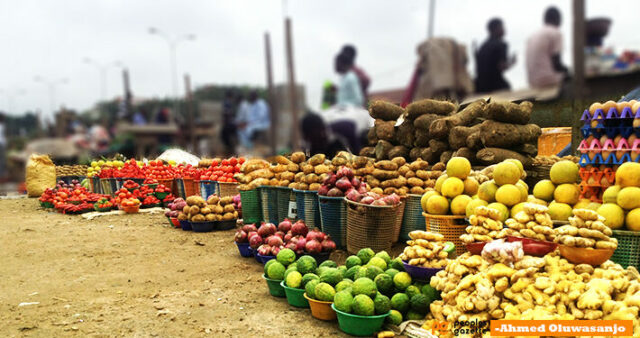Slow progress on food security sparks concerns
Stakeholders in Nigeria’s agriculture industry are urging the Federal Government to strengthen its food security strategy by closing gaps in policy implementation, credit access, and sector monitoring, following new GDP figures that show a worrying slowdown in growth.
According to the National Bureau of Statistics (NBS), the sector grew by just 0.07% year-on-year in real terms in Q1 2025 — a slight 1.85 percentage-point improvement over Q1 2024, but a steep 2.48-point drop from Q4 2024’s 2.54% growth. Agriculture contributed 23.33% to GDP in Q1 2025, down from 24.04% in Q1 2024 and 28.68% in Q4 2024. The sector’s four key sub-activities — crop production, livestock, forestry, and fishing — all continue to face structural and productivity challenges.
The weak performance has raised alarms amid surging food prices, worsening insecurity, and rising operational costs for farmers. Industry experts warn that without stronger monitoring and grassroots-aligned interventions, Nigeria’s food security risks deepening further.
Mechanisation Programme Needs More Than Announcements
In May, President Bola Tinubu launched the Renewed Hope Agricultural Mechanisation Programme, commissioning 2,000 tractors for deployment nationwide. The initiative aims to modernise farming, boost yields, and reduce manual labour through a service-provider model.
However, Tunde Banjoko, Chairman of the Agricultural and Allied Trade Group at the Lagos Chamber of Commerce and Industry (LCCI), criticised the lack of visible follow-through.
“The tractors have been bought — but where are they? Who is using them? Have they impacted costs? We need independent, non-political monitoring to ensure they are making a difference,” he said.
Banjoko also decried the politicisation of agricultural programmes and the lack of public engagement from research institutions, stressing that farmers, community leaders, and traders must be part of the conversation.
Access to Credit Remains a Major Barrier
Despite the Federal Government’s ₦1.5 trillion recapitalisation of the Bank of Agriculture and a pledge of ₦200 billion for direct interventions, farmers say affordable loans remain out of reach.
Banjoko noted that commercial lending rates of 29–34% make agriculture unviable. Rosemary Effiong, Chairperson of the Coalition of NGOs in Agriculture and Sustainable Development, added that loan limits and rollout timelines must reflect current economic realities. She called for low-interest financing to shield farmers from inflation and ensure sustainable production.
Civil Society Eyes Transparency in Tractor Deployment
Andrew Mamedu, Country Director of ActionAid Nigeria, welcomed the government’s plan to install tracking systems on tractors but insisted that civil society be granted access to the data. Partnering with the Small-scale Women Farmers Organisation in Nigeria (SWOFON), ActionAid plans to verify tractor use in all 774 local government areas and publish reports every six months.
Scaling Up Special Agro-Industrial Processing Zones
Stakeholders also pushed for expansion of the Special Agro-Industrial Processing Zones (SAPZ) in collaboration with the African Development Bank. Banjoko said the initiative ensures stable markets for farmers and steady supply for processors, many of whom currently run far below capacity. He urged states to adopt the model and abandon token “empowerment” schemes.
Food Security is Key to Economic Stability
Segun Ajayi-Kadir, Director-General of the Manufacturers Association of Nigeria, stressed that insecurity and logistics bottlenecks in farming communities must be addressed to stabilise the real sector. He linked stronger agricultural output to easing food inflation and improving citizens’ welfare.
From Slogans to Measurable Impact
While the Tinubu administration has declared an agricultural renaissance, stakeholders say change will only come when mechanisation is matched with credible monitoring, funding becomes accessible, and policies are backed by measurable outcomes.
With GDP data showing slowed growth and falling contributions to national output, calls for urgent reforms are growing louder — and patience is wearing thin.














Post Comment